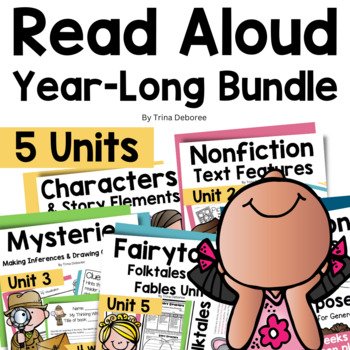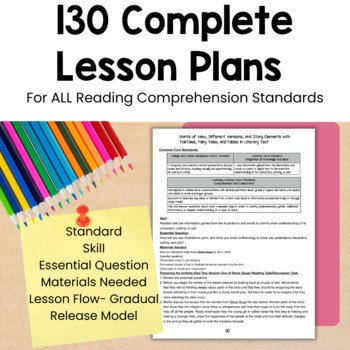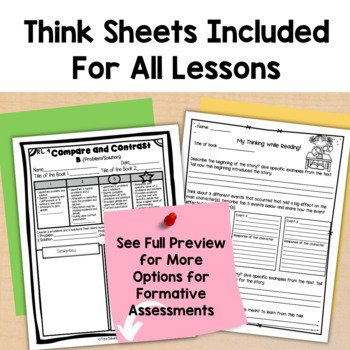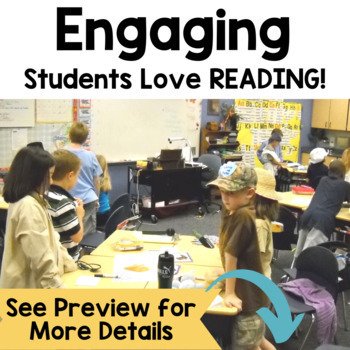Interactive Read Aloud Lesson Plans Mega Bundle: Reading Units Read Aloud 2nd
Are you a second-grade teacher who wants your students to go deeper into reading comprehension and you are looking for inspiring books? Interactive Read-Aloud Lesson Plans for 2nd Grade Comprehension gives you everything you need to encourage a deep understanding of the story or information while also encouraging a love of reading while SAVING 50% off with this bundle. Lesson plans, read-aloud activities, and reading response printables are included for each unit for the entire 2nd-grade year.
The teacher reads a book through the week and models how to think deeply, ask questions, determine the point of view, monitor comprehension, and so much more. Essentially students are working to better understand and utilize what they are reading and hearing. This can be used as a shared reading, an interactive read-aloud, or a close reading activity.
Each week we focus on a different comprehension standard and strategies that will take young readers on a reading journey that will help them fall in love with books, as well as learn to deeply think about the text. All lessons are aligned with standards. This can be used as a stand-alone curriculum or as a supplement to your current curriculum.
Each reading unit is standards-based and includes complete lesson plans, graphic organizers for formative assessment with digital and print options. (Digital options are available with TpT Easel.)
Bundled Reading Units for the Entire Year- These close reading workshop lesson plans were created for teachers BY a teacher. Each of these units provides 4-6 weeks of detailed Reading instruction. Lessons include essential questions based on Reading Standards, a mini-lesson (or sometimes a maxi-lesson), a gradual release of responsibility framework, an introduction to a standard, a close reading with the focus on fluency, comprehension, or vocabulary. Formative assessments are included.
Additional Differentiated Standards-Based Assessment with rubrics, an area for student input, and differentiated options have been added since June 2018.
These are the concepts/Standards that are covered in Unit 1:
A close look at characters and an introduction to Reading Workshop
Genre focus: Realistic Fiction and some Fantasy
RL.1 Asking and answering questions
RL.2 Recounting stories
RL.3 Character responses to major events and challenges
RL.4 Word meaning
RL.5 Story structure- how the beginning introduces a story and the end concludes the story
RL.6 Point of View
RL.7 Information gained from illustrations
RL.9 Compare and contrast two versions of the same story
RL.10 (Text complexity increases throughout the unit)
Unit 2:
Informational Text An Introduction to Nonfiction
Can be used with any type of Informational Text/Nonfiction
RI.2 Main idea
RI.3 Connections in concepts/events/procedures
RI.5 Text features
RI.6 Author's purpose
RI.7 Specific images and how they contribute to text
RI.8 Supporting details that support the author's purpose
RI.10 (Complexity is high if use technology integration ideas given)
Unit 3:
Gripping Characters with a focus on Mysteries
Genre: Mysteries
RL.2 Recounting stories
RL.3 Character responses to major events and challenges
RL.4 Word meaning
RL.6 Point of View
RL.7 Information gained from illustrations
RL.9 Compare and contrast two versions of the same story
RL.10 (Complexity builds in this unit. Mysteries are great for inferring and analyzing text)
Unit 4:
Informational Text with an integration of the Content Areas (Science- Life Cycles and The Body)
Genre: Informational Text/Nonfiction
Technology Integration
RI.1 Asking and Answering questions
RI.2 Main idea
RI.4 Word meaning
RI.5 Text features
RI.7 Specific images and how they contribute to text
RI.9 Compare and contrast points of view presented by two texts on the same topic
RI.10 (Complexity is high if use technology integration ideas that are given in lesson plans)
Unit 5:
Folktales, Fairytales, and Fables
Genre: Folktales, Fairytales, Fables, Fantasy
RL.1 Asking and answering questions
RL.2 Recounting stories
RL.3 Character responses to major events and challenges
RL.4 Word meaning
RL.6 Point of View
RL.7 Information gained from illustrations
RL.9 Compare and contrast two versions of the same story
RL.10 (Complexity is high in this unit. Fables and folktales can be especially difficult for younger students to grasp. A high level of support may be needed in this study.)
All Reading Standards are taught, and ample assessment is available in each unit.





